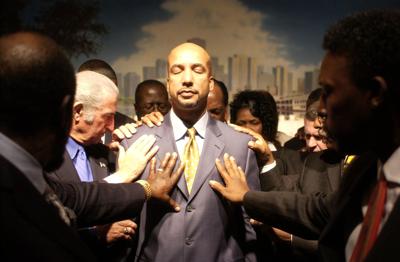Former New Orleans Mayor Ray Nagin was released from federal prison Monday, about three years before he was due to complete his 10-year prison term on corruption charges.
Nagin, 63, was the beneficiary of a policy implemented by U.S. Attorney General William Barr, who a month ago ordered the Bureau of Prisons to make way for more federal prisoner releases to address coronavirus concerns.
Barr asked the bureau to consider the age and vulnerability of the inmate to COVID-19, conduct in prison and a re-entry plan, with priority given to inmates in low- and medium-security facilities like the camp in Texarkana where Nagin was housed.
The bureau’s implementation of the plan has weathered criticism, and there were questions about who qualified.
Federal defendants awaiting trial in parish jails across the New Orleans area are having little luck convincing judges to send them home based…
Given his lack of a prior criminal record and the fact he’s completed most of his sentence, Nagin turns out to be “a perfect candidate” for an early release under Barr's directive, said Claude Kelly, the federal public defender whose office represented Nagin in his failed appeal.
U.S. Attorney Peter Strasser did not return a call seeking comment late Monday.
Nagin's release was confirmed late Monday by his brother-in-law, Cedric Smith, who managed his unlikely campaign for mayor in 2002. Smith said Nagin was with his family in Frisco, Texas, a Dallas suburb where Nagin bought a place after Hurricane Katrina, and where the family settled after he left office in 2010.
"He's doing fine," Smith said. "It's a great day for our family. We're really happy he's back home."
Smith said it was his understanding that Nagin would not have to serve time in a halfway house, a typical stop along the way for federal offenders. Halfway houses, like prisons, have come under fire amid the COVID-19 crisis because they tend to keep inmates in dorm-like settings where the virus can spread.
A former executive with Cox Cable, Nagin emerged from obscurity to win the 2002 race in a landslide. He was elected to a second term in 2006, a year after Hurricane Katrina, in a hotly contested race where he narrowly bested then-Lt. Gov. Mitch Landrieu.
Nagin was convicted in 2014 on a raft of corruption charges, ranging from wire fraud to bribery and tax evasion. He always maintained his innocence. But a jury agreed with federal prosecutors' contention that he took hundreds of thousands of dollars in bribes and free granite slabs for a family countertop business in exchange for steering city work to the contractors that paid him off.
U.S. District Judge Ginger Berrigan gave Nagin a 10-year sentence, which was well below the term of between 15 and 20 years that the federal guidelines called for. But Berrigan said she thought Nagin deserved a more lenient sentence based on several factors, including his age and the remote possibility that he would ever be able to violate the public trust again.
“I must make an independent assessment of the case, no matter how highly publicized and divisive the case might be,” she said.
She noted that Nagin, then 58, was older than most of the defendants the guidelines are written for. Also, she said, his “reputation and credibility have been almost irreparably harmed,” meaning he'll likely never hold a position of trust again.
Ironically, perhaps, Berrigan had asked that Nagin be sent to a federal prison camp in Oakdale so that he could be close to family. That facility has recently been racked by a coronavirus outbreak that has killed at least seven prisoners.
Instead, in September of 2014, he was sent to the federal prison in Texarkana, which is actually closer to Dallas.
A federal judge on Monday denied former New Orleans Mayor Ray Nagin’s appeal of his conviction and 10-year sentence for corruption charges.
By the time of Nagin's sentencing, his family was financially ruined. Though Berrigan ordered him to pay $84,264 in restitution and to forfeit more than half a million dollars, the family had by then filed for bankruptcy.
They owed almost $42,840 in back taxes to the IRS and had more than $180,400 in outstanding loans or other debts. Meanwhile, in court documents at the time, Nagin's wife, Seletha, reported that she was working as a clerk at Bath and Body Works in Frisco and earning about $490 a month. The family was receiving food stamps, which provide $312 a month, as well as about $400 a month from their sons Jeremy and Jarin, who were unindicted co-conspirators in the corruption case.








